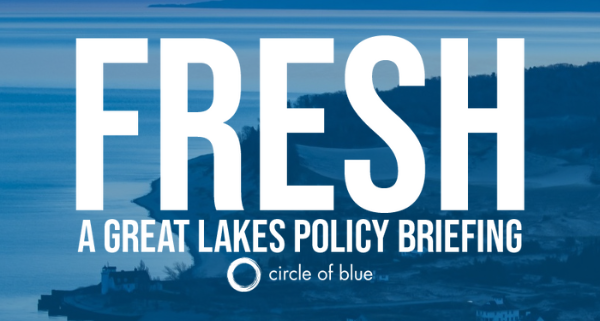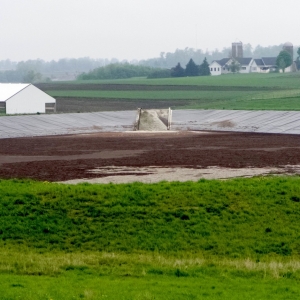Fresh, May 30, 2023: $30 Million EPA Grant Program Targets Pollution in Disadvantaged Communities
May 30, 2023
Fresh is a biweekly newsletter from Circle of Blue that unpacks the biggest international, state, and local policy news stories facing the Great Lakes region today. Sign up for Fresh: A Great Lakes Policy Briefing, straight to your inbox, every other Tuesday.
— Christian Thorsberg, Interim Fresh Editor
This Week’s Watersheds
- The Great Lakes ice season ended with the fourth-lowest average ice cover in half a century.
- A $30 million EPA grant program will fund environmental justice projects in historically underserved Great Lakes communities.
- A recent land purchase will extend the amount of protected shoreline along Brule River State Forest, a key nesting habitat for the endangered piping plover.
- A federal judge is begging the Bad River Band of Lake Superior Chippewa to work with Enbridge as a Line 5 pipeline decision looms.
In Minnesota, stricter penalties for water overuse are signed into state law.
“We felt it was necessary because [the Minnesota Department of Natural Resources] plays an important role in ensuring our water resources or resources are protected, and that there’s a sustainable water supply available for future generations.” — Katie Smith, the department’s director of ecological and water resources.
In Minnesota, water-use permits are required for cities, businesses, farmers, and anyone else who withdraws more than one million gallons of water per year. Permit holders are required to report their annual water use to the state Department of Natural Resources.
But instances of noncompliance have cropped up over the past few years, as have accidents that strained the state’s groundwater reserves — including Enbridge Line 3’s puncturing of aquifers in 2021, or farmers overdrawing water during drought that same year.
The new bill increases fines for those who use more than their allotted amount of water, and “requires repeat or serious offenders to pay, instead of forgiving the penalty if the violations are corrected,” Minnesota Public Radio reports.
Fresh from the Great Lakes News Collaborative

- Air Force dispute with state environmental regulators could jeopardize new PFAS extraction project — Michigan Radio
- Michigan is the king of potato chips. But a disease is killing state spuds — Bridge Michigan
- With lawsuits stalled in Michigan, Nessel seeks Line 5 shutdown in Wisconsin — Bridge Michigan/Great Lakes Now
The Great Lakes News Collaborative includes Bridge Michigan; Circle of Blue; Great Lakes Now at Detroit Public Television; and Michigan Radio, Michigan’s NPR News Leader. We work together to produce news and information about the impact of climate change, pollution, and aging infrastructure on the Great Lakes and drinking water. This independent journalism is supported by the Charles Stewart Mott Foundation. Find all the work here.

Great Lakes Environmental Justice Grant Program Gets $30 Million Boost
The Great Lakes Environmental Justice Grant Program will receive $30 million to “help advance environmental protection and restoration projects in communities that have been disproportionately affected by pollution in the Great Lakes region,” Wisconsin Public Radio reports.
The EPA has identified “principal recipients” of grant funds to include nonprofit organizations, tribes, local governments, and universities. The goal is for these recipients to then create grant programs themselves, within the communities they serve.
The program’s funding comes via the federal Bipartisan Infrastructure Law, which was signed into law in November 2021.
In the News
ICE-OFF: The last bit of ice on the Great Lakes melted on May 18 to close out the year’s ice season, which saw the fourth-lowest ice coverage over the past 50 years, the Milwaukee Journal Sentinel reports. According to NOAA data, average ice coverage this year was 6.2 percent, significantly lower than the 24.5 percent average since 1973. Fluctuations in ice coverage have been more prevalent over the past decade, from extreme lows (like this year) to extreme highs (92 percent in 2014), the Journal Sentinel reports. The swings are likely a result of climate change affecting Midwestern winters.
BRULE RIVER STATE FOREST: An additional half-mile of Lake Superior shoreline has been added to Wisconsin’s Brule River State Forest, Wisconsin Public Radio reports. The nearly 200 acres of land were purchased for nearly $600,000, funded largely by the Great Lakes Restoration Initiative and a $52,800 donation from the Landmark Conservancy Trust. “The purchase will result in a contiguous three-mile corridor along Lake Superior extending from the Bayfield County line to the Bois Brule River,” WPR reports. The agreement also expands the amount of protected habitat for the endangered piping plover, known to nest along the region’s shores.
Looking Ahead
ENBRIDGE LINE 5 LATEST: A federal judge has said that he is “not inclined” to shut down the Enbridge Line 5 oil pipeline in response to concerns raised by the Bad River Band of Lake Superior Chippewa, the Associated Press reports. The tribe has argued that the pipeline “is at immediate risk of being exposed by erosion and rupturing on reservation land.” Fewer than 15 feet separate the Bad River and Line 5, and in some locations, 20 feet or more of riverbank have eroded in the past month of high river flows. The tribe’s denial of Enbridge’s requests to install sandbags and plant a treeline barricade to prevent erosion influenced the judge’s comments. “I’m begging the band to just act. Do something to show you’re acting in good faith.”
Upcoming Events
May 31 — Great Lakes Fishery Commission Annual Meeting — learn more
June 2 — 2023 Michigan Climate Summit — learn more
June 6-9 — Great Lakes and St. Lawrence Cities Initiative 20th Anniversary Annual General Meeting — learn more
Other News
SMART BUOYS: The Cleveland Water Alliance re-deployed several “smart buoys” — digital water quality monitors — throughout Lake Erie to detect E. coli, algae, and dissolved oxygen, Fox Business reports.
GARY CIVIL RIGHTS COMPLAINT: Advocates in Gary, Indiana, have filed a federal civil rights complaint against the Indiana Department of Environmental Management after the agency renewed permits for a waste processing facility that residents say disproportionately affects the health and water quality of the city’s Black and brown communities, Indiana Public Radio reports.
Christian Thorsberg is an environmental writer from Chicago. He is passionate about climate and cultural phenomena that often appear slow or invisible, and he examines these themes in his journalism, poetry, and fiction.







Leave a Reply
Want to join the discussion?Feel free to contribute!